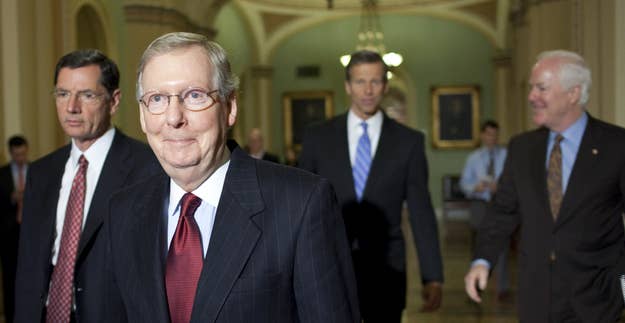
WASHINGTON — Vice President Joe Biden and Senate Minority Leader Mitch McConnell Monday evening agreed to a stop gap measure to stave off economic calamity resulting from the nation tipping over the fiscal cliff.
Sources in the administration and Capitol Hill said the deal would redefine "wealthy" to include those making $400,000 or more a year and includes a two-month postponement of the so-called "sequester" — a series of deep defense and domestic spending cuts.
Biden was meeting with Senate Democrats Monday night to explain the deal. Although Democrats are very unhappy with the agreement — numerous Senate aides called it a "sell out" of basic Democratic principles by the Obama White House — they were nevertheless expected to fall in line.
It was still unclear whether the Senate would actually voten New Years Eve on the agreement, although there was no chance a final deal would be in place before the nation went over the fiscal cliff at midnight.
The House of Representatives will not vote Monday on a package of tax and spending changes, meaning that they cannot be passed into law before the New Year's Eve deadline. The Senate could still vote on the agreement.
The dramatic sounding changes compelled by the "cliff," however, are still likely to happen in name only, after Sunday night negotiations between Vice President Joe Biden and Senate Republican leader Mitch McConnell produced a deal on taxes. And indeed Congressional staffers played down the cable news doomsaying that surrounds the blown deadline. Congressional staffers said Monday that they hope to vote on legislation before Thursday, when the next Congress is sworn in. Stock markets were closed when news of the Congressional failure broke Monday; they reopen Wednesday.
"If a deal is reached, there is little substantive difference between a vote at midnight and a vote tomorrow," said one House Republican aide.
"We've got to get this done before the next Congress. Things get considerably more complicated if we don't," said a senior Senate Republican staffer.
And the key policy agreement appears to have been reached: The deal would set the threshold for income tax hikes at $400,000 for individuals and $450,000 for couples, raise the estate tax rate to 40 percent on estates larger than $5 million, and permanently extend the Alternative Minimum Tax.
"All of the details of the tax piece are finalized. They're done," one Senate GOP aide said.
They will also be easier for politicians to stomach on Tuesday, when the Bush tax cuts have technically expired, and any of the tax alternatives will technically become a "tax cut."
Senate Minority Leader Mitch McConnell confirmed the deal in a statement delivered on the Senate floor.
"I can report that we have reached an agreement on all of the tax issues," McConnell said, urging a vote on that portion of a deal as soon as possible.
The agreement would also extend unemployment insurance — without paying for it.
Details regarding for how the sequester will be extended are still being hashed out by senate negotiators.
"We'll continue to work on finding smarter ways to cut spending," McConnell said.
But not all senators were pleased with the deal. Shortly after news of the agreement broke, Democratic Sens. Sherrod Brown, Al Franken and a "handful of other Democratic senators marched into Reid's office...to tell him they didn't like the deal," a Democratic Senate aide said.
Of course, a compromise between McConnell and Biden doesn’t necessarily mean the agreement can pass. McConnell won’t agree to anything his conference would revolt against, nor is he likely to back a deal that would barely squeak through the chamber.
The biggest remaining question is whether the agreement can actually get buy-in from House Speaker John Boehner. The Ohio Republican and his leadership team will likely stay mum on the details of the deal until after the Senate votes on the agreement, a senior GOP aide said.
“I don’t expect Boehner to take any ownership of this thing,” the aide said, noting that if the fiscal cliff deal garners upwards of 80 votes in the Senate, then Boehner and his team will likely begin pushing aggressively for its passage.
That level of support in the Senate would likely mean at least some of the chamber’s conservatives would back the agreement, which in turn should mean Boehner will have little trouble rounding up Republican votes.
Significantly, aides said Boehner remains committed to the so-called “Hastert Rule” that requires the bill to have majority Republican support before being brought to the floor. Boehner’s devotion to the informal rule has caused him headaches in the past — including last week’s embarrassing Plan B failure.
Regardless, it’s now clear that Congress will be in session through the beginning of the New Year. Aides said the House could take up a supplemental appropriations bill to pay for Hurricane Sandy recovery efforts tomorrow, and it will almost certainly take at least 24 hours for both chambers to pass the fiscal cliff agreement.

